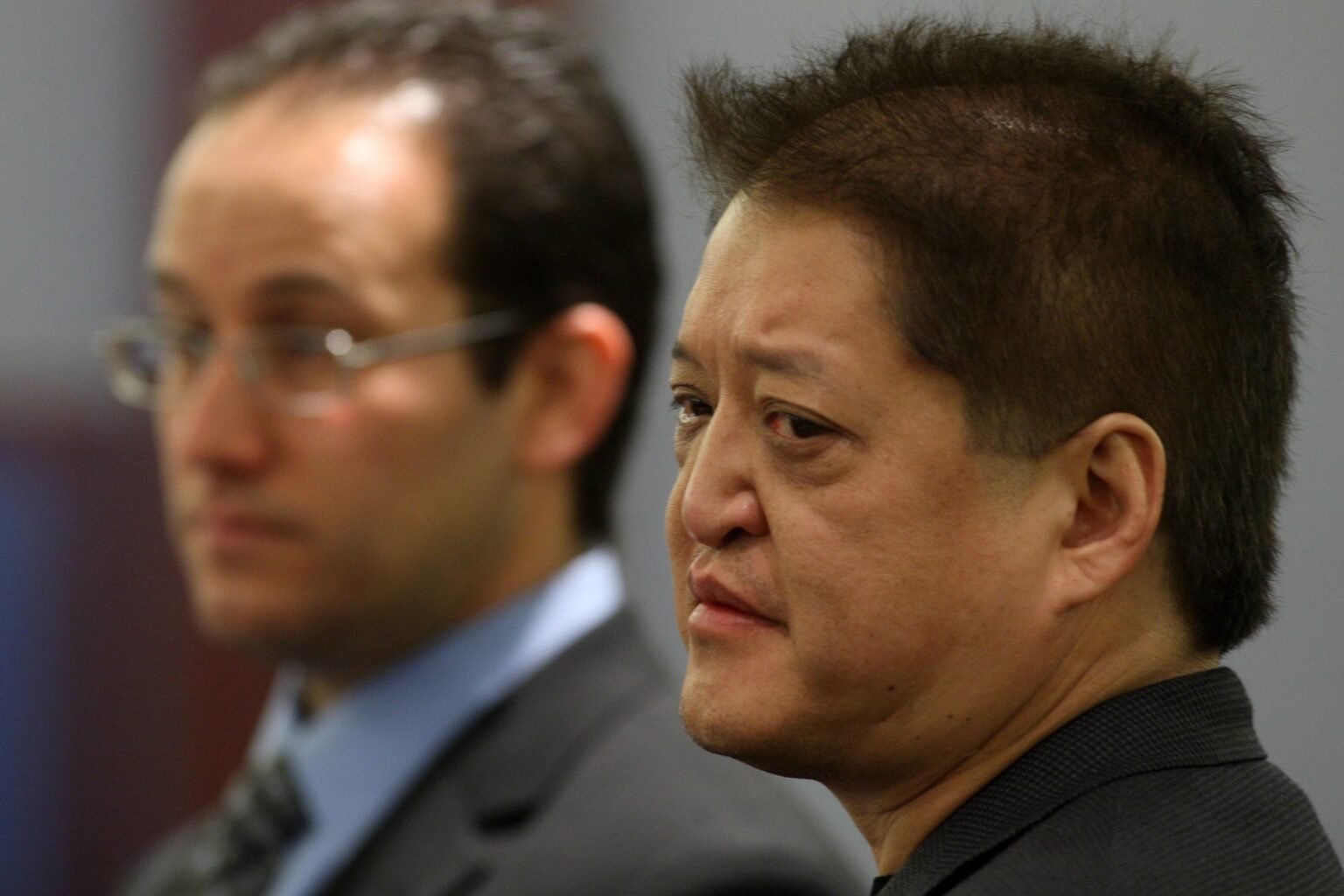Las Vegas is renowned for its high-stakes, high-roller gamblers, often referred to as “whales,” who serve as the lifeblood of every casino lining the Strip. When a whale arrives at a casino, wagering tens of thousands, or even more, executives go to great lengths to ensure their contentment and continued gambling in the establishment.
In the realm of whales, Nebraska-born businessman Terry Watanabe was the apex. In fact, he was a whale of a whale, among the biggest of them all.
During an astonishing year-long gambling spree, Terry managed to lose a staggering $204 million at two prominent Las Vegas casinos. And he didn’t stretch this mind-boggling loss over a decade; he squandered it all in the span of a single year.

Terry Watanabe: An Introduction and His Wealth Origins
Terry Watanabe, born in 1957 in Omaha, Nebraska, hailed from a family deeply rooted in entrepreneurship. His father, Harry, laid the foundation for the Oriental Trading Company in 1932, an enterprise specializing in plastic trinkets, party decorations, and supplies. Harry initiated this venture after immigrating to the United States from Japan.
Terry and his siblings actively participated in the family business from a young age, often assisting their father after school. His mother served as the company secretary, making it a truly family-run enterprise.
At the age of 15, Terry’s father approached him with the customary Japanese offer for the first-born son: the opportunity to take over the family business. Embracing this tradition, when Terry reached the age of 20, he assumed the role of CEO at Oriental Trading, Co. During this phase, Watanabe was known for his reserved and introverted demeanor.
Notably, Terry displayed a remarkable talent for marketing by carefully selecting which products to incorporate into the Oriental Trading catalogue. Over time, he transformed his father’s modest toy and trinket enterprise into a thriving mail-order empire, boasting an impressive annual revenue of $300 million by the year 2000.
As adept as Terry was in his professional career, it consumed his existence to the exclusion of all else. His dedication led him to embark on extended journeys abroad, scouring far-flung corners of the world in search of merchandise. This intense focus left no room for serious romantic relationships, marriage, or children; his life was synonymous with the Oriental Trading Company.
In 1995, Watanabe made a substantial investment in a sprawling 18,000 square-foot residence in Omaha, valued at $1.8 million. Alongside his business commitments, he emerged as a prominent benefactor to philanthropic causes in Omaha, generously contributing millions to AIDS charities and services.
In the year 2000, Terry finalized the sale of Oriental Trading Co., the exact sum undisclosed. With this transition, he envisioned a life post-business centered on even more extensive philanthropic engagements and the pursuit of personal enjoyment.
“If it’s not fun, it’s not worth doing,” Terry Watanabe declared to the Omaha World-Herald in 2000.
However, Watanabe’s transition into a philanthropist’s life left him feeling unfulfilled. Having devoted a significant portion of his existence to Oriental Trading Co., he found himself at a loss for how to occupy his newfound leisure time. Eventually, he stumbled upon the world of casinos.
Just across the river from Omaha, in Council Bluffs, Iowa, lies a Harrah’s casino. In 2003, Terry began frequenting this establishment as a means of passing the time. What started as a pastime quickly escalated, and he swiftly earned a reputation as one of the casino’s most prominent patrons.
In 2005, Terry Watanabe embarked on trips to Las Vegas, where the dazzling lights and allure of the city only intensified his gambling and drinking habits. Within a remarkably short span, he found himself virtually living and gambling full-time at the prestigious Wynn Las Vegas casino.
Watanabe’s extravagant betting activities soon captured the attention of the casino’s owner at the time, Steve Wynn. After meeting with Watanabe, Steve Wynn arrived at the conclusion that Terry not only exhibited compulsive gambling tendencies but also struggled with alcoholism. To adhere to the stringent regulations set forth by the Nevada Gaming Control Board, which prohibited casinos from allowing visibly intoxicated and belligerent individuals to gamble, Wynn made the difficult decision to bar Watanabe from his establishment.
Nevertheless, the city of Las Vegas had no shortage of casinos eager to cater to the needs of someone grappling with alcohol addiction and a penchant for gambling.
Harrah’s, in particular, extended enticing offers to Terry Watanabe in their bid to lure him to their casinos. These incentives included a substantial monthly stipend of $12,500 to cover airfare, exclusive tickets to rock concerts and shows, and a generous $500,000 credit for use at their gift shops. As if that weren’t enough, Watanabe was entitled to receive 15% cash back on table losses exceeding $500,000.
During his stay at Caesars, Watanabe enjoyed the luxury of a complimentary three-bedroom suite. The casino ensured he had access to a special brand of vodka and was attended to by a retinue of Harrah’s-supplied assistants, catering to his every whim and requirement. To add to the extravagance, seven-course meals from the esteemed Bradley Ogden restaurant were served directly to him while he indulged in marathon gambling sessions.
The question of blame for Terry Watanabe’s colossal losses in the casino world raises a complex and nuanced issue. While Terry was undoubtedly drawn into a world of opulence and extravagance, it’s essential to consider the broader context.
The casinos, in their pursuit of high-stakes gamblers like Terry, created an environment that catered to his every desire and need. They offered irresistible incentives, luxurious accommodations, and personal assistance, effectively crafting a golden handcuff scenario that made it exceptionally challenging for someone like Terry Watanabe to walk away.
For Terry, a guarded and work-focused individual with limited personal relationships, Las Vegas became his kingdom. The allure of being treated like royalty in this captivating world was undeniably intoxicating. It’s a situation where responsibility is shared, with both the individual and the casino playing roles in the high-stakes drama that unfolded.
Terry Watanabe stood out as an unconventional whale in the world of high-stakes gambling. While most high rollers gravitate toward games like baccarat, poker, and blackjack, Watanabe had a penchant for games with low odds, such as roulette and slot machines. In Las Vegas, he was often referred to as a “house player” because these games heavily favor the casino.
Watanabe did engage in blackjack but approached it with minimal skill and strategy, essentially transforming it into a game that favored the house. He had a unique gambling style that set him apart.
His gambling sessions were legendary, often lasting a grueling 24 hours straight, where he could lose millions in a single binge. Remarkably, he played three blackjack hands simultaneously, each with a $50,000 limit. At one point, Harrah’s extended his credit line to a staggering $17 million, a practice not uncommon for high rollers seeking to capitalize on their gambling pursuits.
During his peak in 2006, Terry Watanabe found himself consistently losing an astonishing $5 million per day. As his gambling spiraled out of control, concerns began to surface among employees at Caesars and Rio casinos. Watanabe was frequently in a state of severe intoxication, rendering him incoherent. Under Nevada Gaming Control regulations, it should have been the casino’s responsibility to promptly discontinue his play and remove him from the premises.
However, Harrah’s, which owned the casinos, did not take this course of action. Watanabe had become their cash cow, or rather, their cash whale. While there was no official policy to intentionally keep him drunk and gambling, his photograph was prominently displayed in employee areas, making it clear to all that he was a highly valued guest. Harrah’s was determined to retain one of the most financially lucrative gamblers in history.
Terry Watanabe’s situation sheds light on the complex relationships that casinos have with their high rollers. These establishments entice them with lavish incentives, including complimentary suites, limitless alcohol, and generous credit lines. High rollers receive private jet travel and a team of personal attendants catering to their every need. Competition among casinos to attract these individuals is fierce, but managing them poses its own set of challenges. Many high rollers are compulsive gamblers with substantial wealth but little restraint, and their losses, along with their lives, can quickly spiral out of control with each roll of the roulette wheel or dealt blackjack hand.
Some gamblers, Terry Watanabe included, have attempted to shift the blame onto casinos by filing civil suits, although such efforts are seldom successful.
Terry Watanabe was known for his generosity toward casino employees, often bestowing bundles of $100 bills totaling as much as $20,000 in tips, along with other lavish gifts. However, halfway through the year, he had already lost more than $50 million. Just a few months later, that number had ballooned to over $100 million. When his lawyers endeavored to calculate his annual losses, they initially estimated it at $127 million. However, after a lawsuit forced Harrah’s to reveal their internal records, Terry’s legal team made a shocking discovery: his actual losses amounted to an astonishing $204 million. It’s essential to emphasize that this staggering sum was lost within the span of just one year.
Terry Watanabe finally opened up to his sister and brother about his gambling losses during Thanksgiving in 2007 when they visited him in Las Vegas. Until then, they had been unaware of the extent of his gambling problem. Two weeks after this admission, his sister returned to Las Vegas, packed his belongings, and brought him back to Omaha. He entered a residential treatment facility and, to date, has not set foot in a casino again.
In 2008, Watanabe made the decision to sell his Omaha mansion for $2.66 million and relocated to San Francisco.
Remarkably, he managed to repay $112 million of his losses before initiating a civil lawsuit against Harrah’s. His legal action alleged that casino staff deliberately served him alcohol as part of a well-orchestrated plan to keep him gambling. Furthermore, Watanabe claimed that the casino failed to honor their commitments regarding cash back incentives for certain losses.
In 2009, the Clark County District Attorney’s office brought four felony charges against Watanabe, accusing him of theft and intent to defraud Harrah’s of $14.7 million.
However, in 2010, the criminal charges against Watanabe were dismissed, and he entered into arbitration with Harrah’s to address his remaining debts. The terms of the settlement reached between the two parties were not disclosed, marking the conclusion of the largest criminal case ever filed by the Clark County District Attorney’s office.
To this day, Terry Watanabe’s extraordinary yearlong gambling spree, resulting in losses totaling $204 million, remains the most substantial losing streak by an individual in the history of Las Vegas. It is quite possible that it also stands as the most significant individual gambling loss in any casino globally.
